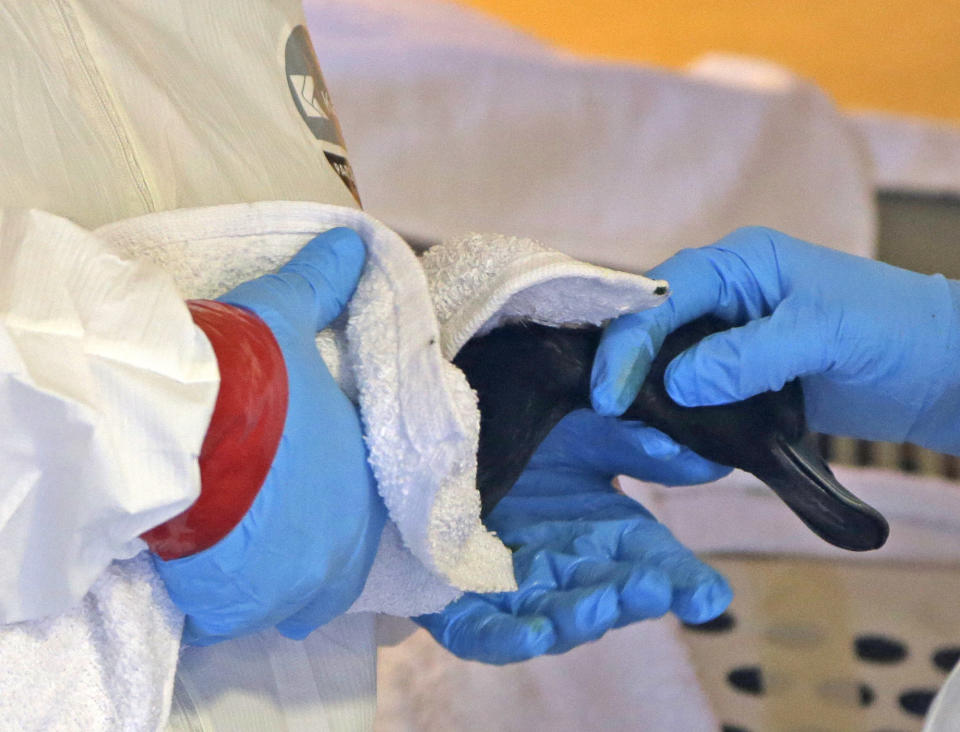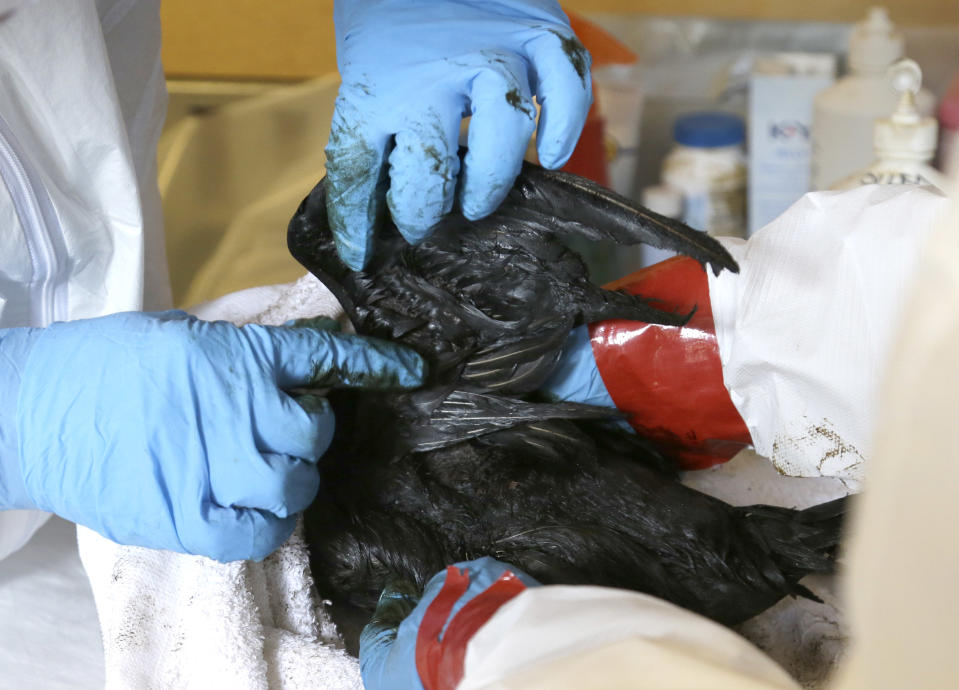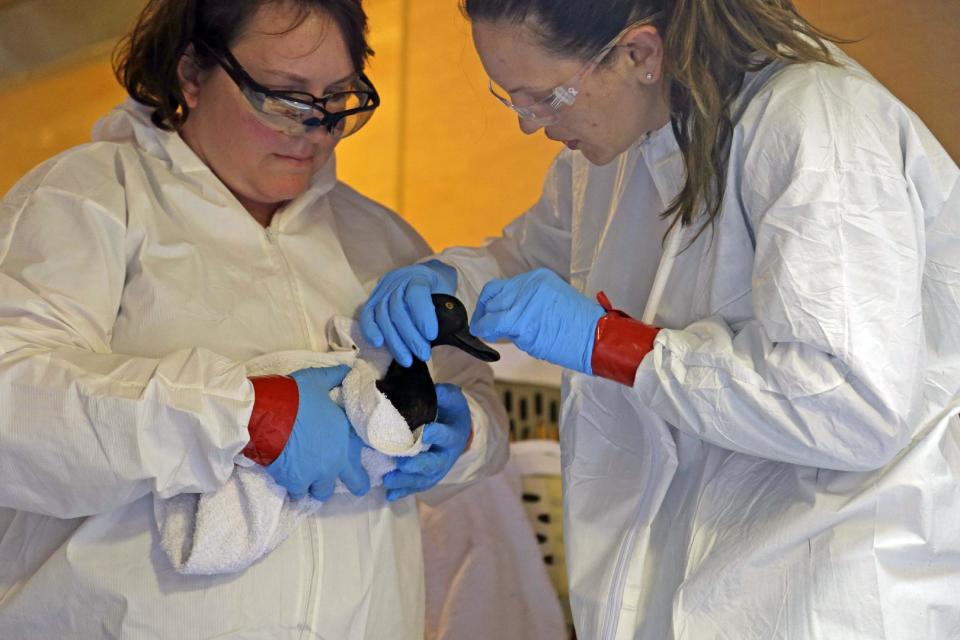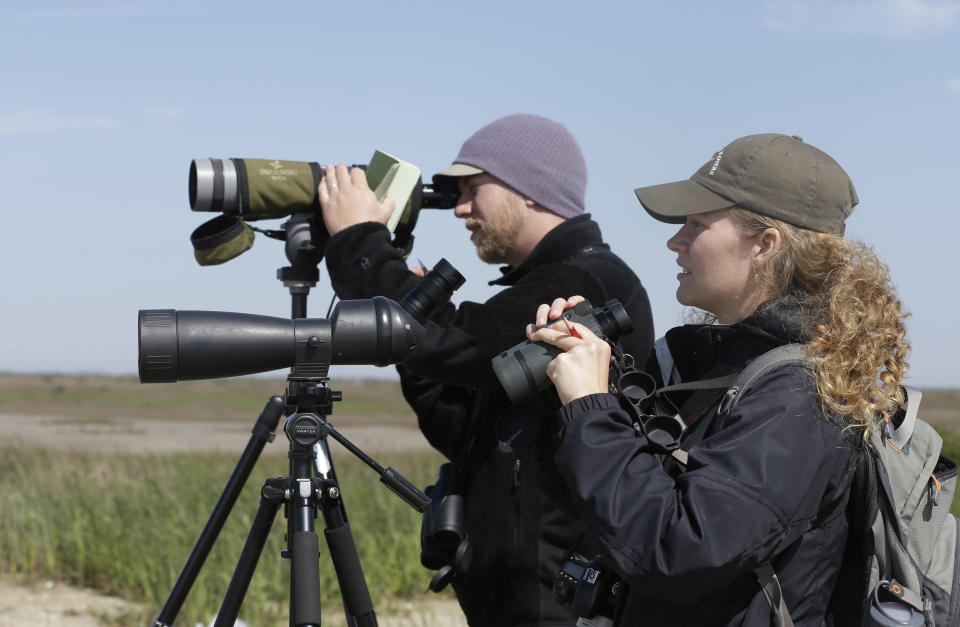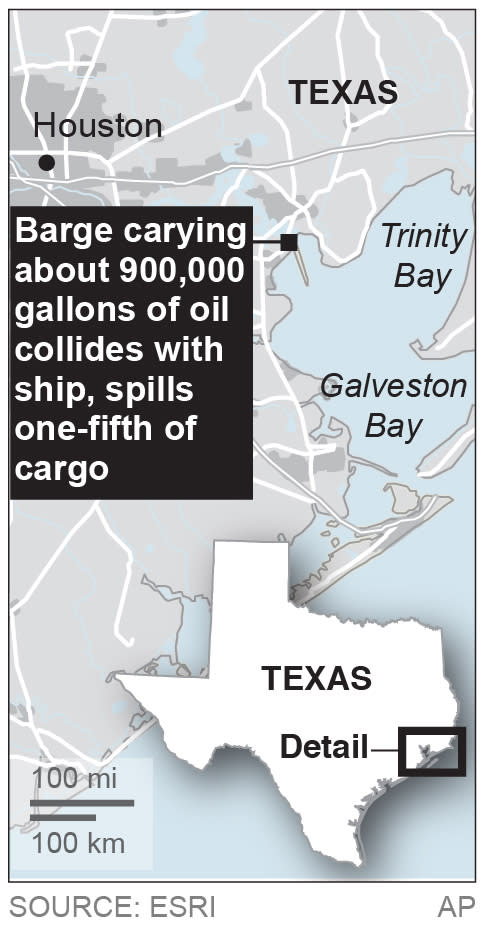Officials hopeful oil spill not hard on wildlife
PORT BOLIVAR, Texas (AP) — Peering through binoculars and small portable telescopes mounted on tripods, two conservationists stood near the beach on Texas' Bolivar Peninsula on Tuesday, searching for birds that might have tar-like oil on them from a weekend spill in the nearby Houston Ship Channel.
Kristen Vale — who wore a cap with the words "Protect Piping Plovers," a reference to a type of shorebird — spotted a small brownish bird darting across the sand.
"A least sandpiper with oil on its belly," Vale told colleague Pete Deichmann, who jotted down the information in a green notebook. Both Vale and Deichmann work for the Houston chapter of the National Audubon Society and were conducting a survey of the Bolivar Flats Shorebird Sanctuary, an area of salt marshes, mud flats and beach that can have up to 10,000 birds daily.
As environmental groups and officials continued to evaluate the possible impact of the spill on wildlife and the shoreline, the Coast Guard partially reopened the Houston Ship Channel on Tuesday after assessment teams deemed it clear enough for passage. The channel had been closed since Saturday, when a barge carrying 900,000 gallons oil collided with a ship, causing the spill. Officials believe up to 170,000 gallons of tar-like oil might have spilled into the waters south of Houston.
Early on during what was to be a nearly three-hour survey, Vale and Deichmann said they were encouraged by initial results that seemed to indicate the effects of the oil on wildlife might not be as great as initially feared. State and federal officials seemed to echo those sentiments Tuesday as they said the effects of the oil spill on birds and other wildlife remains relatively low. But they remained cautious, saying they continue to find injured animals that they are cleaning and treating.
"We'll be here until the last bird has been recovered," said Richard Arnhart, with the Texas General Land Office's oil spill prevention division. "You are going to have various stages of oiled wildlife."
The Coast Guard began to allow more traffic after a test run of two ships — a Carnival cruise and a boat belonging to the Houston Pilots association — to make sure the water was clean. Officials expect it to take about three days for channel traffic to get back to normal.
About 100 ships were waiting Tuesday morning to move through the channel, which connects Southeast Texas to the Gulf of Mexico and is a key route for tourism and traffic to refineries on the Gulf Coast. On a typical day, the channel, part of the Port of Houston, handles as many as 80 large ships, as well as about 300 to 400 tugboats and barges.
Tiffany Parker of Fort Smith, Ark., was finally able to depart for her cruise with friends and family on Tuesday after a two-day delay.
"Most people are not happy and disappointed, but I think they realize it's not Carnival's fault," Parker said. "It's an oil spill."
The amount of oil spilled was much less than such major U.S. disasters as the 1989 Exxon Valdez disaster in Alaska, which dumped 11 million gallons of oil into the Prince William Sound, and the Deepwater Horizon spill, which resulted in 100 million gallons of oil entering the Gulf of Mexico four years ago.
But it still required a major cleanup effort by state authorities who laid down miles of tube-like barriers and deployed yellow-uniformed workers to pick up black, quarter-sized "tar balls" washing up on shore. Wildlife protection workers picked up birds stained in oil for cleaning. Officials said nearly 20 birds injured by oil had been found and were being treated. An additional 10 birds have died from oil exposure.
The Coast Guard hopes to get as much oil out of the water as possible within the next 24 hours, deploying skimmers in some areas, as winds are expected to pick up Wednesday and move remaining oil toward the Texas shoreline.
Officials believe most of the oil is drifting out into the Gulf of Mexico and heading southwest, which should limit the impact on bird habitats around Galveston Bay as well as beaches and fisheries important to tourists. Workers ready to clean up oil residue are stationed in counties south of Galveston, officials said.
Environmental groups said the spill occurred at an especially sensitive time and place. The channel in Texas City, about 45 miles southeast of Houston, has shorebird habitat on both sides, and tens of thousands of wintering birds are still in the area.
One of those habitats is the Bolivar Flats Shorebird Sanctuary on more than 1,100 acres on Bolivar Peninsula. Between 50 and 70 species of birds can be found at the sanctuary.
Vale said the spill had "very bad timing" as the spring bird migration is starting. But she was encouraged that she and Deichmann weren't finding completely oil-covered birds.
"That's hopeful thinking," she said.
___
Nomaan Merchant reported from Dallas.

